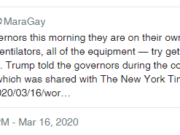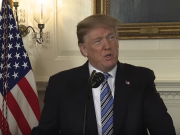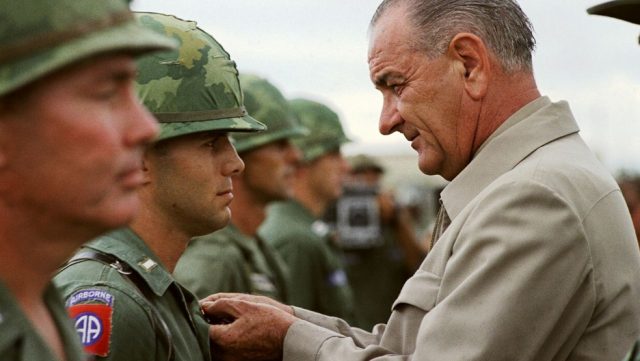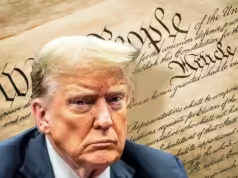A rare consensus has formed between left-wing Democrats like Sen. Tim Kaine (VA) and libertarian Republicans like Sen. Rand Paul (KY) and Rep. Justin Amash (MI) that, under our Constitution, military deployments like President Trump’s recent missile strike on Syria require congressional approval and even a declaration of war (unless the country faces an imminent threat).
They are wrong.
Under Article I, Section 8, Clause 11 of the Constitution, Congress alone has the authority to declare war. However, Article II Section 2 of the Constitution makes the president alone the commander-in-chief of the U.S. armed forces.
To resolve the question of which branch has the power to make war, we need to look at the original intent of the Framers. Start with the fact that nowhere in the Constitution is there any requirement that a congressional declaration of war is a prerequisite to the president deploying the military. Then consider that fully 90% of all U.S. military engagements from 1780 to 1880 were conducted without a declaration of war. (See War Powers and the Constitution, 1984, by John Charles Daly, p. 22.)
These facts make apparent that the men who wrote and ratified the Constitution as well as the men who organized and led our federal government in the first decades under the Constitution understood the Constitution not to require a declaration of war before a president could take military action.
But what about the War Powers Act, which requires congressional consent when a president makes a long-term military deployment?
Simply put, this act is blatantly unconstitutional.
The War Powers Act was passed by Congress in 1973 when Congress felt that it had done too little to constrain various presidents’ conduct of the Vietnam War. It requires the following:
- The president must consult with Congress in “every possible instance” before introducing troops into hostilities;
- Unless Congress officially endorses the military action within 60 days of deployment, the president must withdraw the troops within 30 more days; and
- The president must submit a report in writing to Congress within 48 hours after deployment of troops.
(The Act also included a provision stating that Congress can force the president to withdraw troops before the 60-day time limit with a concurrent resolution that was not subject to a presidential veto. However, this kind of legislative veto was declared unconstitutional by the Supreme Court in 1983.)
President Richard Nixon vetoed the War Powers Resolution when it reached his desk, stating,
President Nixon’s entirely appropriate veto was overridden by a two-thirds vote of both houses of Congress (demonstrating that congressional Republicans have been unprincipled since long before the Trump administration).
As Nixon warned, the War Powers Act is an unconstitutional infringement of the president’s plenary powers as commander-in-chief under Article II of the Constitution, and most presidents since its passage also have so stated. As former General and National Security Adviser Brent Scowcroft once said,
The Congress arrogates to itself the right to force the president by its inaction to do something the Constitution says he does not have to do, to pull the troops out . . . . [B]ecause it is unable to make up its own mind, it forces the president to behave other than as commander-in-chief.
No president has ever fully complied with the War Powers Act, and no congress has ever sought court action to compel such compliance. Rather, presidents and congresses who all have been afraid to subject the Act to judicial review have found ways to compromise.
Even if the War Powers Act were constitutional, it would still be terrible policy. It is impractical at best and dangerous at worst to expect a congress of 535 members and thousands of staff to maintain secrecy when military action is being contemplated and planned.
In the words of John R. Silber in his 1985 New Republic article “Presidential Handcuffs,” when covert operations are debated openly in Congress and are printed across the country in newspapers, “we must be overtly covert or covertly overt.”
Indeed, in the years since the passage of the War Powers Act, presidents of both parties have pointed out how compliance with the Act would have endangered military missions and those performing them:
- President Ford stated that if he had followed the Act when he deployed the Marines to recapture the American ship Mayaguez, the mission “might not have been successful.”
- President Carter disregarded the Act when he sent U.S. forces into Iran in an (unsuccessful) attempt to rescue American hostages because the mission required secrecy.
- President Reagan ignored the Act and, in fact, informed British Prime Minister Margaret Thatcher before members of the U.S. Congress when he successfully sent the U.S. Marines to liberate Granada. He also disregarded the Act when he deployed Marines to Lebanon but voluntarily worked with Congress when the deployment became more long-term.
Former Democratic Senator Frank Church (ID) summed up why the War Powers Resolution is completely unnecessary:
And there’s the rub: Congress need not try to infringe upon the president’s plenary powers to lead the military as commander-in-chief because the Congress itself has a plenary power that serves as a check on the president: The power of the purse.
Simply put, no president can deploy troops or maintain a deployment unless Congress appropriates the funds for such deployments and actions.
So, as usual, the question of which branch of government has the power to “make” war is properly and best answered in the Constitution itself: The president may deploy the military at his discretion and need not seek permission from Congress. However, since Congress controls the funding for such operations, and because Congress most closely represents the sentiments of the American people at any given time in our representative democracy, effective and successful presidents consult with Congress out of practical necessity. No further restrictions are either permitted or necessary.
As then Representative (and later Secretary of Defense and Vice President) Dick Cheney once said, “We look to the president to make decisions that are naturally made by a commander-in-chief rather than a legislative body.”
Author: Ken Falkenstein
Ken Falkenstein is the Managing Editor of Committed Conservative and brings a wealth of experience and expertise in public affairs to the job. Ken served in the U.S. Army in the last years of the Cold War as a Russian linguist for military intelligence and the NSA. After leaving the Army, he earned his degree in Secondary Education from Old Dominion University, where he also wrote a popular column in the student newspaper.
Upon graduation, Ken worked as a Legislative Aide to two Republican members of the Virginia House of Delegates. Ken also served as Corresponding Secretary of the Young Republican Federation of Virginia, managed several successful political campaigns, and managed governmental affairs operations for a local Realtor association.
In 1995, Ken moved to Washington, DC to serve as a Legislative Assistant to Sen. John Warner (R-VA). While working for Sen. Warner, Ken attended law school at night, earning his J.D. with honors from the George Mason University School of Law (n/k/a The Antonin Scalia Law School). Since that time, Ken has practiced as a civil litigation attorney, including serving for three years as an Associate City Attorney for the City of Virginia Beach, Virginia.
Ken previously was a contributor to the highly-regarded political blog Bearing Drift and was a weekly co-host of The Steve Batton Radio Program. In 2016, Ken ran unsuccessfully for the Virginia Beach School Board. Ken is also a former President of the Down Syndrome Association of Hampton Roads.
Ken now lives outside of Denver, Colorado with his wife, Kim, and three sons, Adam, Dylan, and Joshua, who has Down syndrome. Ken’s writing is motivated and informed primarily by his concern for his kids’ future.
































